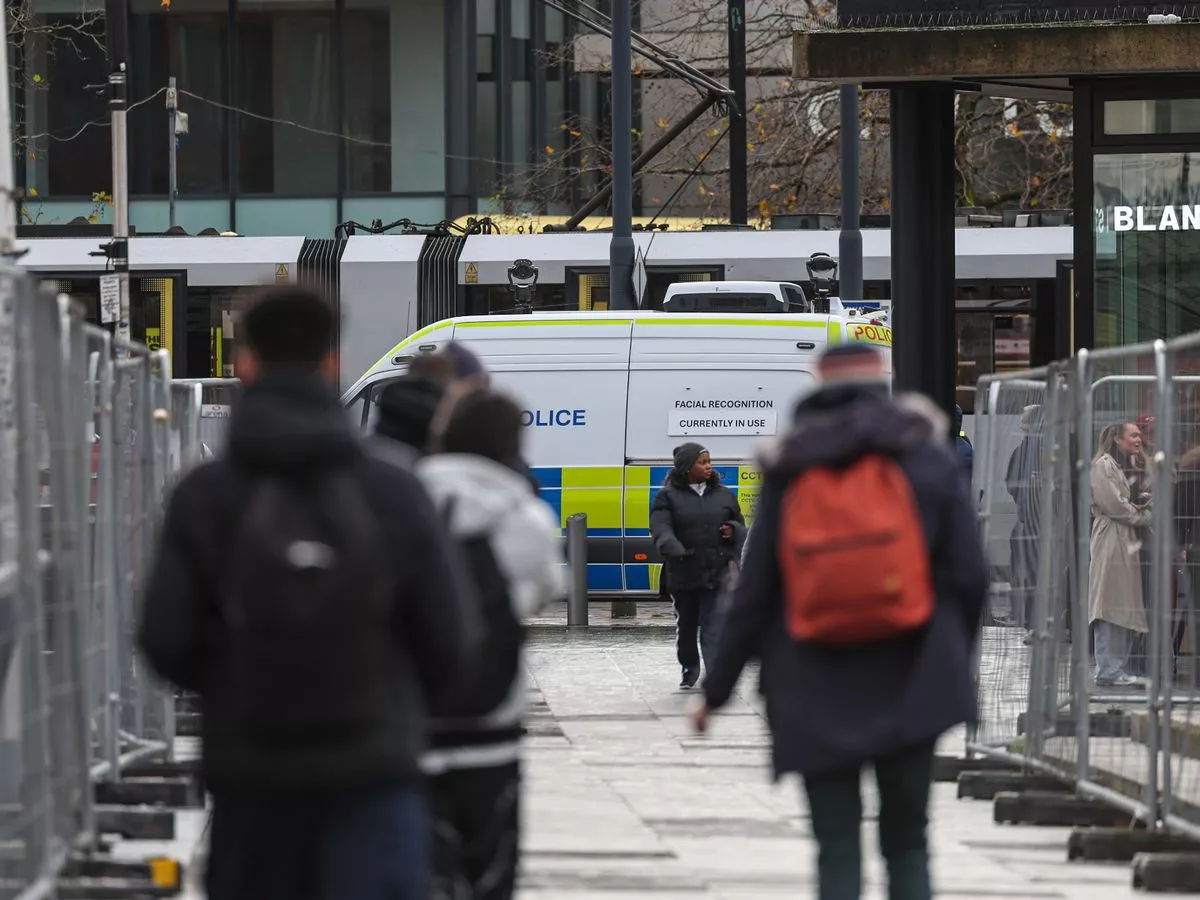Copyright manchestereveningnews

In one of the city's busiest spots, new technology has been used to find Greater Manchester's most wanted. Live facial recognition technology has been introduced by Greater Manchester Police in recent weeks. Today (November 3), it was used in Piccadilly Gardens for the first time. GMP is responsible for two specialist vans , funded by the Home Office, which can be used across the North West. They are each fitted with two fixed cameras, while computers inside the van contain software which uses biometric data to match faces in the crowd to one of the faces on a 'watchlist'. Join our Court and Crime WhatsApp group HERE Use of the cameras led to two men being arrested today - a 40-year-old who was wanted on suspicion of possession of an offensive weapon, and a 36-year-old wanted for criminal damage, with a bail condition not to enter Piccadilly Gardens. Yet the technology is not without its critics, with civil liberties groups campaigning against the use of live facial recognition across the country. But GMP says it follows strict guidance on use of the technology, which it hopes will prove to become a valuable tool in the search for wanted offenders and vulnerable missing people. Piccadilly Gardens was the third location GMP had used the cameras, following two days in Sale and two in Bolton last month. Police say locations are chosen based on intelligence - with Piccadilly Gardens selected as a hotspot for crime, including violence and shoplifting - but the cameras could also be used where major events are taking place, or disorder has occurred. Chief Inspector Mike Tachauer, who works on the city centre at GMP, believes the tool could be a 'real positive' in one of the city's most high-profile areas. He told the Manchester Evening News : "We speak to our community - our businesses, commuters and other users of the city centre. We know that Piccadilly Gardens is a priority for those people. "We know that there have been historic issues here, no one is hiding from that, and we know there is a certain expectation that GMP does its part to make it a safe place. Any tools that are at our disposal that we can bring today in order to forward that imperative, we're really keen to use them." GMP decided to use the technology in Piccadilly Gardens today ahead of the Christmas Markets opening on Friday (November 7). It will also be used for a period of time on that day. Today's 'watchlist' featured 3,000 people - including those wanted for a criminal offence, wanted by the courts, or vulnerable people reported as missing. It also included registered sex offenders and people with court orders containing conditions relevant to Manchester city centre. Chf Insp Tachaeur admits that Piccadilly Gardens could benefit from the technology's use at any time of the year, but police are restricted by the availability of the cameras. Not only are the vans to be used across Greater Manchester, but police in Cheshire, Lancashire, Merseyside and Cumbria can also request to use them. Inspector Jon Middleton , GMP's automatic number plate recognition and live facial recognition manager, says there is a 'good business case' for using the technology in Manchester city centre . "We know from intelligence, and anecdotally from officer experience, that wanted offenders from all over Greater Manchester will travel into the city because it's so accessible," he said. "We know that they will use the Metrolink , buses, so that's why it's advantageous for us. "We know that vulnerable people will tend to be drawn towards the city centre, where they can be criminally exploited as well. So the city's always going to have a good case for deployment of the technology, but we will be everywhere." During today's operation, one of the vans was parked at the Piccadilly end of the Gardens, near to McDonald's, while the other van was based closer to the tram stop. Each had a designated, fixed 'zone of recognition'. Four other arrests were also made by officers supporting the operation, outside of the sight of cameras - including two for drug possession, one for failing to appear at court and one person wanted for a public order offence. Chf Insp Tachauer suggested some people may have walked away from the facial recognition zone to avoid being found - while he also hopes the vans could deter people from committing crime when used in Piccadilly Gardens. "It's not just about catching people that might be wanted," he added. "It's also deterring people from coming into the city that might otherwise do harm when they're here, which is another nice benefit. "So for me it's a real positive. We look forward to hopefully many more deployments in future." Locations for the vans are published in advance online, while clear signs placed around Piccadilly Gardens warned people they were entering the cameras' 'zone of recognition'. During the recent deployments in Bolton, the software found seven matches from the watchlist, leading to three arrests for breaching a court order, breaching crown court bail, and for being wanted for harassment - all in around 90 minutes. Insp Middleton said: "For all of those, you save the officers having to go around knocking on houses looking for those individuals. It's an alternative and more proactive way to get them, in many respects." Among the others spotted in Bolton, one was a registered sex offender and another had a criminal behaviour order. Both were found to be complying with their restrictions, so they were allowed to continue with their day as normal, with their biometric data deleted. "The good thing with those two is that those individuals know they're being monitored when they're out and about," said Insp Middleton. "The chances of one of the officers recognising that registered sex offender are incredibly low, whereas the technology has picked them out of the crowd straight away." Insp Middleton says the force is being as 'open and transparent' as possible about the technology. "The cameras are pointing, they are fixed, and they capture what we call a zone of recognition," he told the M.E.N. "Within that zone, they look for faces, and then the software takes a biometric of any face it sees - a biometric being a mathematical representation of the face - and it matches it against the watchlist that we have." If the software fails to match a face with the watchlist, it deletes the biometric data - while the CCTV footage is kept for 31 days in case it is needed for complaints or evidence. Insp Middleton says that policy is similar to other CCTV cameras used across the city - including the council's cameras which monitor activity in locations such as Piccadilly Gardens. He says the system works 'incredibly quickly and very accurately', before notifying the operator inside the van, who can inform officers on the beat outside - who then take the decision on what action should follow. "If it is wrong for any reason, [officers will] stop you as long as necessary just to verify your identity and if we confirm that you're not that person, off you go," said Insp Middleton. Officers insist they are only using the technology to find people they are already looking for - and it is not being used as a mass surveillance tool. But campaign groups across the country have been vocal opponents to facial recognition being used by police, while urging the government to introduce specific legislation on their use. Ruth Ehrlich, head of policy and campaigns at the civil liberties charity Liberty, told the M.E.N.: "The escalation of surveillance with facial recognition cameras undermines the rights of local residents, and its deeply concerning that police use of this tech is being expanded when there are no clear laws or safeguards to protect our rights. “Facial recognition technology lets the police track and monitor everyone going about their daily lives. Walking past a camera shouldn’t feel like showing your ID at a checkpoint just to buy a coffee or do the school run. “Fixed facial recognition cameras mark a major escalation in surveillance. The Government must urgently introduce proper laws and safeguards, as other countries have done, to ensure this technology is used responsibly and our rights are respected.” Responding to the concerns of campaigners, Insp Middleton said: "I completely understand the concerns that some people will have. Although there's no specific legislation to cover this, we are guided by national policy and authorised professional practice from the College of Policing, so we're being consistent with what other forces are doing. "We're very open, all our documents - our policies and procedures, data protection impact assessments taking place, equality impact assessments - they're all available online for people to read. We publicise in advance. The vans are marked and liveried, they've got signage out. "Obviously we're taking biometrics of people here today, there's an element of intrusion in that, and we're being as open as we possibly can about it. The key part is, we delete that straight away if you're not on the watchlist. "On the flip side to that small level of intrusion - bearing in mind this is four cameras in the whole of Greater Manchester for probably about six hours today - I would say, when we are arresting people like those guys last week, or we're stopping registered sex offenders - those benefits outweigh the cons. "Certainly, I've spoken to a lot of members of the public on these deployments, and overall they have been really supportive." For more information on GMP's use of live facial recognition, including dates for future deployments, see the force's website .



